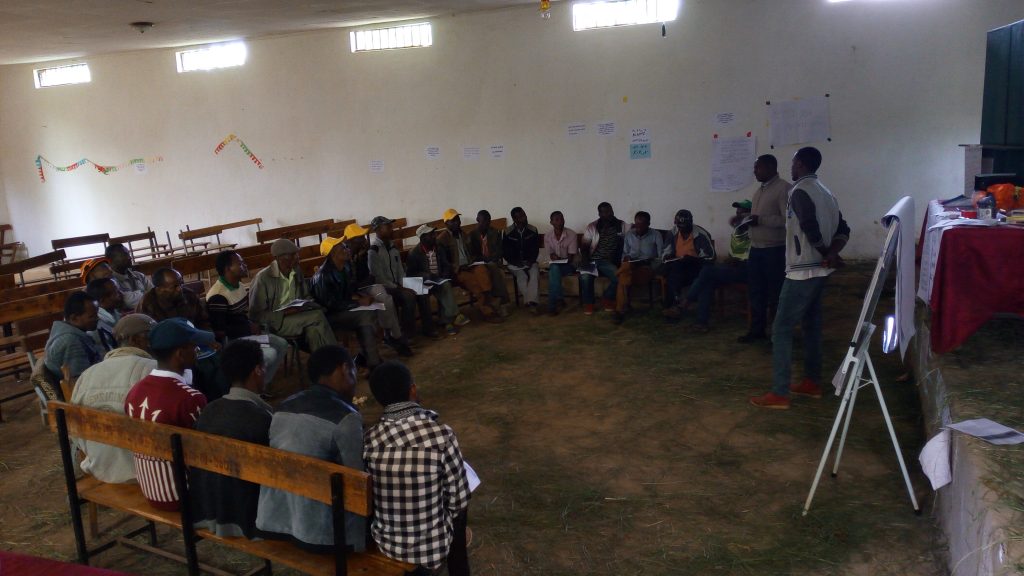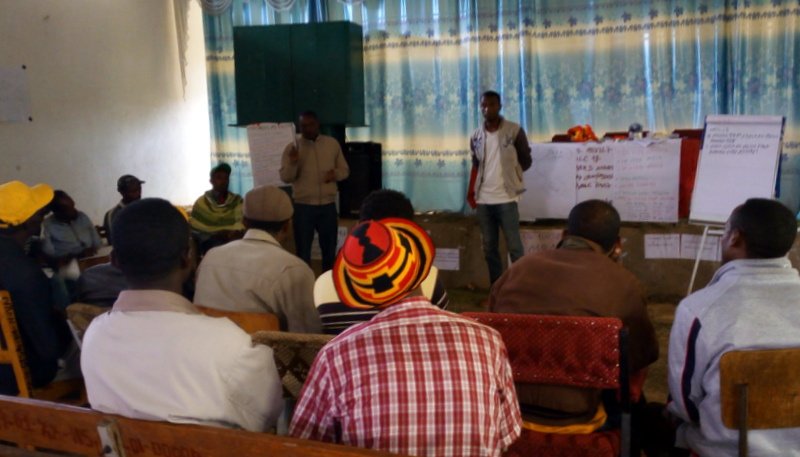We established our four impact programs focused on Healthcare, Education, Financial Inclusion, and Agriculture – now we want to make them sustainable through cooperatives managed exclusively by farmer-leaders.
The Leadership Program at Nuru Ethiopia (NE) has been experiencing something of a reboot lately. We spent our early years focused on crafting a functioning NGO led by committed Ethiopians. Now we have entered a new phase where NE’s Program Managers can begin to transfer responsibilities to community members themselves. Shouldering these responsibilities will be the independently elected men and women who run our Union and Primary Cooperatives.
Leadership’s pivot to hyper-local ownership was pre-planned. Nuru will continue to use relevant trainings and workshops to impart knowledge and skills that help staff and community leaders carry out their goals to end extreme poverty. Our trainings are relevant because they are co-created, meaning local managers used local knowledge to teach local leaders what works on the ground. Here to introduce himself is one of Nuru’s newest leaders, Mekonnen Shimelis, the first General Manager of the Nuru-supported Hidota Cooperative Union.
Hidota Cooperative Union
Seven months ago, I worked with Nuru Ethiopia to establish Hidota Grain Farmers’ Multipurpose Cooperative Union. Hidota is Nuru’s first Coop Union and comprises Nuru’s Primary Cooperatives (PCs) combined into a single business entity. In the next few months we will grow to 21 PCs made up of several thousand men and women; all Nuru farmer families. Uniting together to work as a single Union enables us to coordinate a growing number of farmers spread out across a hundred kilometers of mountainous highlands connected only by dry weather dirt roads. Hidota Union does this in a cost-effective manner while boosting grain profits for our farmer members. In Gamo Gofa, where we work, farmers have faced several consecutive seasons of unprecedented drought and pest infestations. Maize yields and incomes have shrunk significantly. For many, Nuru cooperatives became the last safe haven to access essential financial and social services.
I give credit to Nuru for establishing and supporting our cooperatives, but Nuru does not own them. Neither do large businesses nor wealthy merchants. Nuru farmers are the exclusive owners of their cooperatives. While I am the General Manager of the Union, I remain accountable to the Management Committee who are all Nuru farmers. This is a major shift from the past when poor farmers waited patiently for handouts from NGOs and government. Now farmer-leaders set strategy and maintain budgets worth millions of Ethiopian Birr. Nuru guides cooperative leaders, and local leaders in turn guide thousands of individuals to pull themselves out of poverty. It is a process that is self-replicating and not reliant on outsider assistance in the long-term.
Farmer-owned cooperatives break the cycle of dependency in a safe and sustainable way. Our farmers are able access new markets without risking their financial security. Sustainability comes not only from the way we do business, but also the unique way we select and develop our leadership. Since Nuru does not plan to stay in the same communities forever, PCs must learn to make decisions themselves. High-functioning managers and leaders are key to continuing work after Nuru exits. The way Nuru helps to transform farmers into leaders is straightforward – Training Officers use relevant research-backed trainings and workshops to give local leaders the knowledge and skills to carry out their goals. Often these skills show clear and immediate results – activity and business planning, budgets, and bylaw creation have obvious tangible products. But developing leadership skills can have subtle results as well – committees that consistently meet objectives and inspire members, life-long attitudes of servant leadership, and willingness to work hard in difficult situations. To defeat poverty, we need more than technical skills and cash (although these are necessary too). We need leaders who can advocate for their communities and who have the capabilities and motivation to make a difference. Cooperatives are vehicles where those living in poverty can both benefit and lead for themselves.

Mekonnen Shimelis Shewategegn
I earned a diploma and a BA degree from Haramaya focused on Cooperative Accounting. Dilla University College of Business and Economics awarded me a Finance MBA and Master’s Degree in Business Administration specialized in Finance. I have worked in cooperative and business development. Particularly, I led a team to develop and support cooperatives at Gedeo’s Cooperative Promotion Bureau. My favorite food is shiro. I spend my free time playing football and reading what I can find. I am most proud of the time I spend volunteering and working for projects that support the needy. I am a proud Ethiopian. I speak four languages – Amharic, Oromo, English, and Gedeo.


